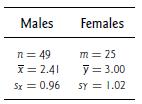Question: Despite its complexity, the English language does not afford many options for how subordinates might address supervisors in the workplace. Calling bosses by their first
Despite its complexity, the English language does not afford many options for how subordinates might address supervisors in the workplace. Calling bosses by their first names strikes a tone that many find too familiar, and adding a title (Mr., Mrs., Doctor, or Professor) may seem stilted and too deferential. What appears to be evolving as a comfortable compromise is a strategy known as “name avoidance”, where workers do not use any form of address in speaking to supervisors.
Whether men or women resort to name-avoidance equally often was investigated in a study (122) where seventy-four subjects (forty-nine men and twenty-five women)—all full-time employees—were asked the following question:
“If you were to encounter your boss’s boss in a hall near your office tomorrow, what do you estimate to be the likelihood of your employing avoidance as an address strategy?”
Responses were given on a 5-point scale, with 1 meaning “very unlikely” and 5 meaning “very likely.” The table below gives the sample means and sample standard deviations for the forty-nine men and twenty-five women.

Is the difference between 2.41 and 3.00 statistically significant? Set up and test an appropriateH0 vs.H1. Use a 0.05 level of significance.
Males n = 49 x = 2.41 Sx = 0.96 Females m = 25 y = 3.00 SY = 1.02
Step by Step Solution
3.44 Rating (173 Votes )
There are 3 Steps involved in it
H0 There is no difference in the likelihood of name avoidance between male and female su... View full answer

Get step-by-step solutions from verified subject matter experts


